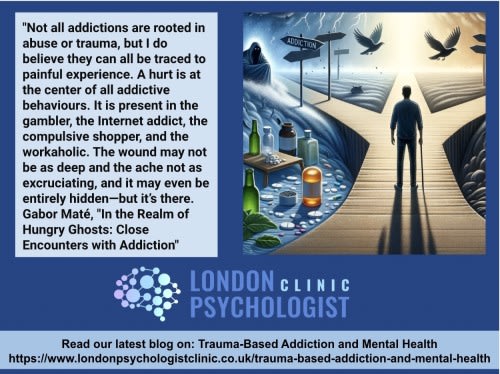Trauma-Based Addiction and Mental Health

posted 27th March 2024
The Intertwined Paths of Alcohol and Mental Illness
In the journey of life, few roads are as intertwined as those of alcohol use and mental illness. Both paths, often shadowed and winding, affect millions worldwide, creating a nexus that demands our understanding and compassion. This blog delves into the intricate relationship between alcohol and mental health, exploring how one influences the other, the challenges of dual diagnosis, and the beacon of hope that treatment and support offer.
The Vicious Cycle
Alcohol, for some, begins as a solace—a temporary escape from the whispers of anxiety, the shadow of depression, or the echoes of trauma. Yet, this refuge is illusory. While alcohol can momentarily dull the edges of mental anguish, its long-term use exacerbates the very demons it was meant to silence, often leading to a vicious cycle where mental health issues and alcohol abuse feed into each other.
Alcohol affects the brain's chemistry, altering mood, cognition, and behaviour. Over time, it can contribute to the development or worsening of mental health disorders. For those already battling conditions like anxiety, depression, or PTSD, alcohol serves as a catalyst for a deeper descent, magnifying symptoms and complicating recovery.
Conversely, mental illness can pave the way for alcohol misuse. Many individuals turn to alcohol as a form of self-medication, an attempt to manage symptoms independently. This approach, however, is fraught with danger, leading to a dependency that only entrenches the mental illness deeper.
The Challenge of Dual Diagnosis
When alcohol misuse and mental illness coexist, they create a dual diagnosis—a complex condition that presents unique challenges in both diagnosis and treatment. The overlapping symptoms of both issues can make it difficult for professionals to untangle the web of causality and address the core problems effectively.
The path to recovery in cases of dual diagnosis is nuanced, requiring a holistic approach that addresses both the mental illness and the alcohol dependency. Treatment options include:
Integrated Treatment: Combining services for mental illness and substance abuse, providing a cohesive approach to therapy.
Medication Management: Using medications to treat mental health disorders while managing alcohol dependency.
Counselling and Therapy: Engaging in psychotherapy to explore the roots of both the mental health condition and the substance use disorder.
Support Groups: Finding solidarity and understanding within groups facing similar challenges.
Recovery is not a journey walked alone. Beyond professional help, the support of family, friends, and community plays a pivotal role in navigating the road to healing. Education and open conversations about the interplay between alcohol and mental health are vital in destigmatizing these issues and encouraging those affected to seek help.
The dance between alcohol and mental illness is intricate and challenging, but understanding and intervention can light the way to recovery. By recognising the signs, seeking professional help, and supporting each other, we can guide those trapped at the crossroads of alcohol and mental health towards a brighter path.
The Crucial Role of Psychologists in Trauma-Based Addiction
One of the most critical steps in the journey towards healing from the intertwined issues of alcohol misuse and mental illness, particularly when rooted in trauma, is seeking the expertise of a psychologist. Psychologists play a pivotal role in unraveling the complex threads that link trauma to addiction, offering therapeutic interventions that are tailored to the individual's experiences and psychological needs.
Understanding Trauma-Based Addiction
Trauma-based addiction occurs when individuals turn to alcohol as a coping mechanism for unprocessed trauma, such as abuse, loss, violence, or any profoundly distressing event. This form of self-medication may provide temporary relief but ultimately leads to a cycle of dependency and exacerbation of mental health disorders.
How a Psychologist Can Help
Identifying the Root Causes: Psychologists are trained to identify and understand the underlying causes of addiction and mental illness. Through various therapeutic techniques, they can help individuals confront and process traumatic events in a safe environment.
Developing Coping Strategies: Beyond addressing past trauma, psychologists work with individuals to develop healthy coping mechanisms for stress and anxiety, reducing the reliance on alcohol as a coping tool.
Supporting Through Recovery: Recovery is a long-term process that involves more than just abstaining from alcohol. Psychologists provide ongoing support, helping individuals rebuild their lives, relationships, and self-esteem post-recovery.
The Importance of Seeking Help Early
Early intervention is paramount, especially in cases of trauma-based addiction. The longer trauma and addiction are left unaddressed, the more entrenched they become, making recovery more challenging. Seeking help early can mitigate the long-term psychological effects of trauma and prevent the development of severe dependency issues.
Recognising the need for help and making that first step to consult a psychologist can be daunting, but it is a critical move towards recovery. Psychologists not only provide a non-judgmental space for healing but also offer the professional guidance necessary to navigate the complexities of trauma and addiction.
Dealing with the aftermath of trauma and the grip of addiction requires professional support and intervention. Psychologists specialise in providing this support, guiding individuals through the process of healing and recovery. If you or someone you know is struggling with trauma-based addiction, reaching out to a psychologist is a vital step towards reclaiming control over one's life and health.



